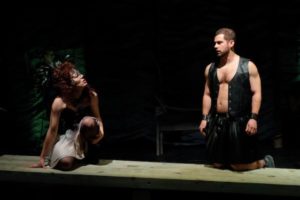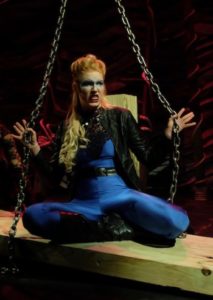
 Highly Recommended **** Jean Racine’s 1677 tragedy Phédre is remembered as the epitome of not only his career, but of neo-classical writing and one of the masterpieces of French-language drama. But in English, neo-classical tragedies are forgotten, and when the Restoration Era is remembered at all, it is for comedies. The story of Phaedra’s quasi-incestuous one-sided obsession with her step-son, which was dramatized by ancient writers Euripides and Seneca, is still told mostly through Racine’s lens: Transcendent Ensemble Theatre Company performed an adaptation of Racine’s text by Matthew Maguire a few years ago, and Court Theatre performed the Paul Schmidt version in 2002. Still, in the absence of a neo-classical school of acting, how is it possible to perform any version of Racine’s text? That’s where Trap Door comes in.
Highly Recommended **** Jean Racine’s 1677 tragedy Phédre is remembered as the epitome of not only his career, but of neo-classical writing and one of the masterpieces of French-language drama. But in English, neo-classical tragedies are forgotten, and when the Restoration Era is remembered at all, it is for comedies. The story of Phaedra’s quasi-incestuous one-sided obsession with her step-son, which was dramatized by ancient writers Euripides and Seneca, is still told mostly through Racine’s lens: Transcendent Ensemble Theatre Company performed an adaptation of Racine’s text by Matthew Maguire a few years ago, and Court Theatre performed the Paul Schmidt version in 2002. Still, in the absence of a neo-classical school of acting, how is it possible to perform any version of Racine’s text? That’s where Trap Door comes in.
Director Nicole Wiesner uses Schmidt’s translation, but adds to it the Eastern European expressionistic movements which are a staple at Trap Door. At this time last year, they were doing a similar experiment with The Duchess of Malfi, but Racine’s much tighter script allows Wiesner and her highly energetic cast to more fully exploit their toolbox. As the audience enters, Hippolytus (Dennis Bisto) is sitting in a palace which set designer J. Michael Griggs has made look more like a prison. Only after the play starts do we see that Theramenes (John Kahara), the strange man making Hippolytus uncomfortable, is something like a friend. Hippolytus is the wild-born son of the hero Theseus (Carl Wisniewski) and the Amazon queen Hippolyta, but now, Theseus is married to Phédre, the sister of a woman he was forced by the gods to abandon. Idolizing his father but terrified and ashamed of how the gods manipulate mortals’ passions, Hippolytus refuses all romantic overtures, and won’t even express his love for the hostage princess, Aricia (Abby Blankenship). This, of course, enrages Venus (Hallie Ecker), who decides to take a terrible revenge.
For the usual unfair reasons commonly found in ancient tragedy, Venus already had it in for Phédre (Tiffany Bedwell). Granddaughter of the sun and daughter of the judge of the dead, Phédre’s inheritance was to possess piercing perception until Venus caused her mother to breed with a bull and produce the Minotaur. That heritage was shameful enough before Venus caused Phédre to treasonously fall in perverse lust with Hippolytus, which is why she is forced outside by her lady-in-waiting, Enone (Ann Sonneville) while ranting in the style of Blanche DuBois about her hatred for daylight. Phédre would prefer to end her life before she can bring others to harm, but Enone, loyal to a fault, repeatedly cajoles her into doing things that would be sensible if Phédre were an emotionally unbalanced friend, but are disastrous in a person who is actually under a divine curse.
Bedwell’s performance is an impressive reminder that just because an actress maintains an extreme emotional state for seventy-five minutes doesn’t mean she won’t find a varied and nuanced way of expressing it. She is aided by Racine’s interest in psychological complexity (which was unfortunately not retained by other neo-classicists, resulting in the movement’s downfall) and by Schmidt’s wise decision to translate the text into blank verse instead of attempting to replicate the French rhyme scheme. She also has a talented ensemble to play off of; one of Wiesner’s favorite devices is to have them cackle mockingly in the wings whenever Phédre is attempting to be reasonable, increasing her desperation. At other times they cycle through movements expressing ecstasy, self-harm, and illness at an increasingly rapid pace, drawing us into Phédre’s mental state. Still, Bedwell’s performance is the lynchpin, and her most fascinating moment is an elaborate fantasy Phédre devises which fully demonstrates her jealousy, intuition, self-awareness, and despair.
Bisto’s performance makes Hippolytus an easy figure to identify with, and Sonneville is intriguing as a character who sees herself as a take-no-nonsense type but whose amorality ultimately introduces the mortal-on-mortal injustice which makes the play tragic. Rounding out the cast is Emily Lotspeich, who, along with Wisniewski, is a human instrument for sound designer Danny Rockett. Indeed, the well-integrated sound design is another crucial part of Wiesner’s effort to take us into Phédre’s mind, as are Richard Norwood’s lighting, Rachel Sypniewski’s costumes, and Zsófia Ötvös’s make-up. Since it would be tedious and pointless to list every staging device employed during the show, suffice it to say that it’s a treat to see an ensemble find a way to bring Phédre back to life. Trap Door’s loyal followers will doubtlessly be pleased to see how well the style they’ve come to love complements this script, but for a very small investment of time and money, newcomers will also get to see a wide array of performance and design techniques put to good use.
Trap Door Theatre’s production of Phédre runs through February 11, with performances as follows:
Fridays: 8:00 p.m.
Saturdays: 8:00 p.m.
Tickets are $20 on Thursdays and Fridays, $25 on Saturdays, and are 2 for 1 on Fridays. To order, call 773-384-0494 or visit TrapDoorTheatre.com. The show runs seventy-five minutes.
Trap Door is located at 1655 W. Cortland Ave, Chicago, behind Jane’s Restaurant. The entryway is in an alley and designated by a sign on the sidewalk. Free and metered parking is available in the area.
To see what others are saying, visit www.theatreinchicago.com, go to Review Round-Up and click at “Phedre.”







More Stories
“Dummy in Diaspora”
“The Magic School Bus: Lost in the Solar System”
“February House” reviewed by Julia W. Rath